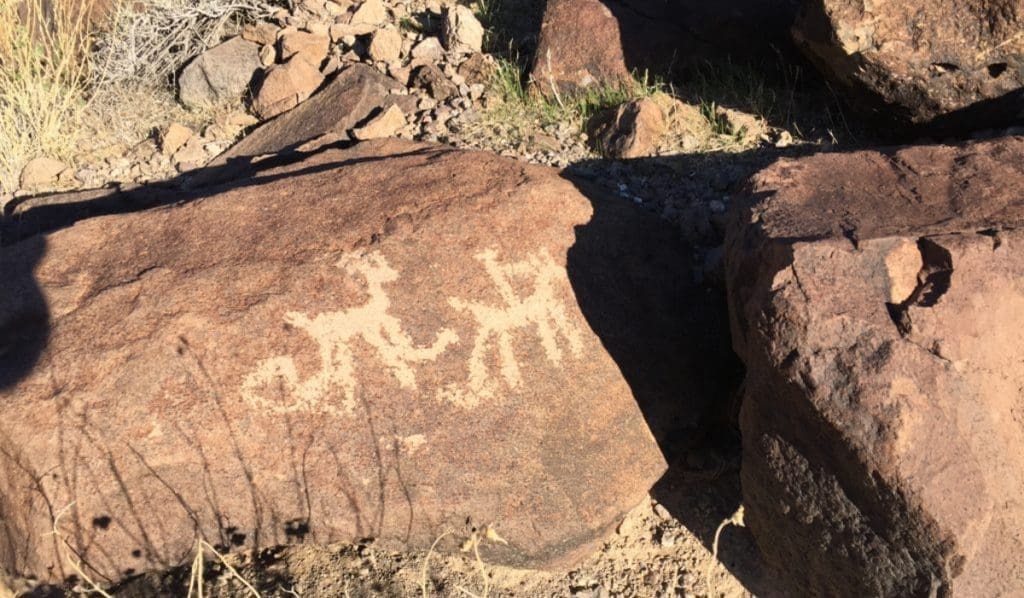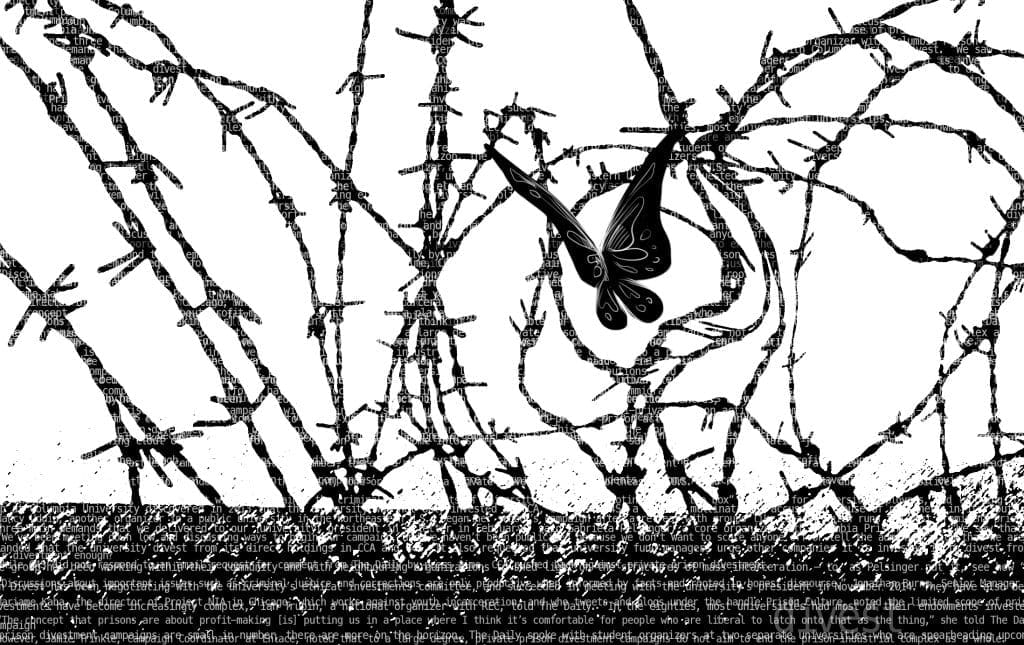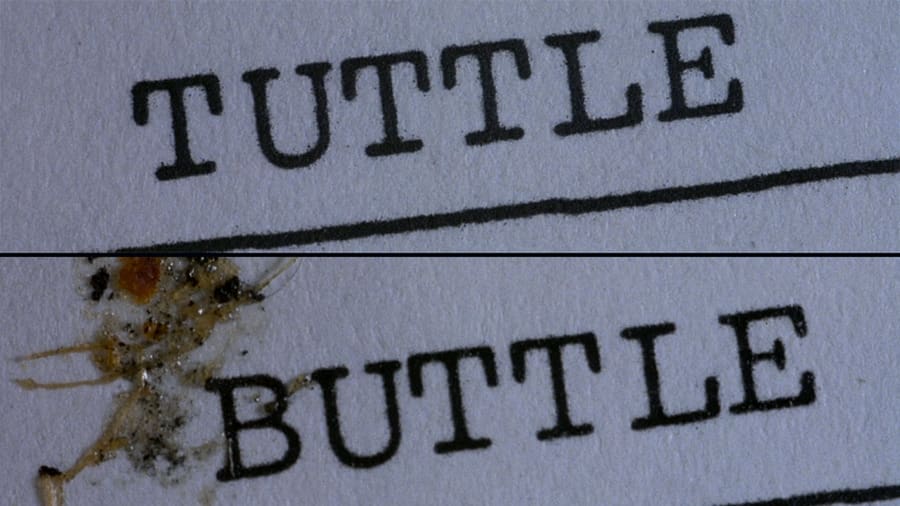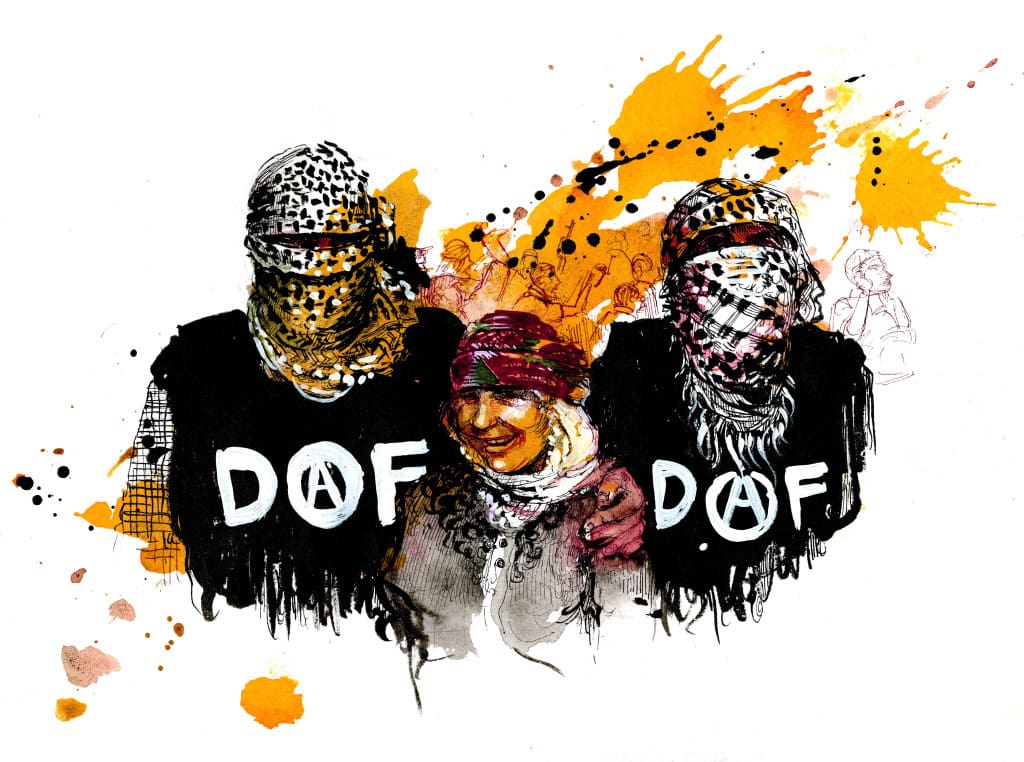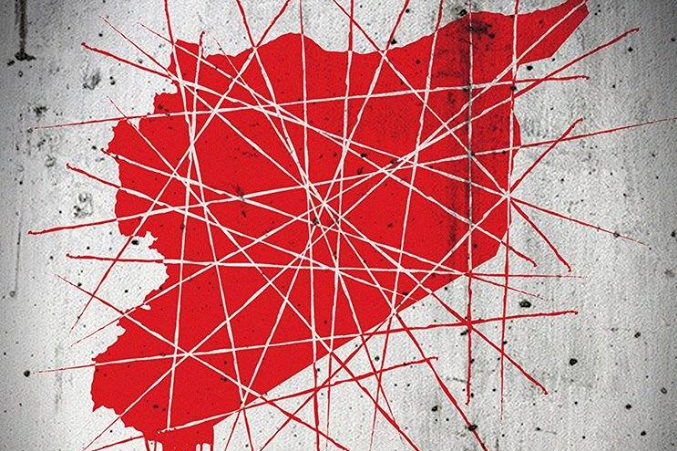Transcribed from the 23 July 2020 episode of This is Hell! Radio (Chicago) and printed with permission. Edited for space and readability. Listen to the whole interview:
One of the things that the desert does to you is it radically decenters your world. It becomes very clear there, very fast, that you are not the center of things. You’re faced with a reality in which you are not even peripheral.
Chuck Mertz: Here we are facing a pandemic, a pandemic that is unleashing even more brutality and cruelty than we were already experiencing with climate change and the everyday violence that permeates our reality. Yeah, things are not great, but at least we still have nature—for now. Returning to This is Hell!, author Ben Ehrenreich is author of Desert Notebooks: A Roadmap for the End of Time.
Ben was on This is Hell! last year to talk about his article in The Baffler, “After the Storm: Progress and the demented quest for historical purity.”
Welcome back to This is Hell!, Ben.
BE: Hey, Chuck, it’s great to be back.
CM: You start your book writing about a hike in nature with a couple of writer friends. This is while you were living with your partner in a small cabin in the desert near Joshua Tree national park. During the hike you see owls in flight. You describe how the owls “took to the air in a sudden rustling burst, and then went silent. I barely glimpsed the first one, a flash of wide white wings as it glided by above us. Too big a thing to be so quiet, it soared off in a broad arc and disappeared behind a hill to the west. The second one, though, passed low enough that for an instant I could see its flat, tawny face, the mottled white and brown plumage of its belly, those bright alien eyes. It circled once and flew out of sight to the east.”
Later you point out, “When I started writing my book, all I wanted was to remember the owls. I wanted to pin them down like any other memory, so they wouldn’t fade too quickly. One day it occurred to me I wanted to be able to read back and remember what it had felt like, the uncanny beauty of their flight, those late autumn flowers, the violet light of dusk, but they didn’t let me. They wouldn’t stop flying. They disappeared behind the rocks and kept reappearing again and again.”
That’s beautiful writing. Those owls essentially inspire this book—so why is it so difficult to put moments like those into words? And more importantly, what does it say about our relationship with nature when that kind of uncanny beauty, as you call it, is so difficult to capture and read back and remember the feeling?
BE: That’s a good question, one that’s eternally flummoxing for writers. What we can accomplish with language is ultimately a different kind of reality than whatever we’re trying to represent with it. We have to learn how to make do. But those owls really literally ended up taking me places that I did not expect to go. I had just started reading about owls in various works of literature and mythology, and in a way that completely surprised me and swept me off my feet for about a year, that resulted in this book.
CM: These are odd paths that we can take, that we should take, that you take. In the book you jump from place to place, but you’re going down different paths. You write, “No matter how pointless things may have felt at any given moment, you could always tell yourself that you were taking part in a conversation, an exchange that stretched back into the immeasurable past, and on into the future that you couldn’t yet imagine. That was the conceit. Not progress, but continuity at least. You could tell yourself that it was the conversation that mattered, the stream of voices flowing through the centuries, this ancient, almost sacred thing that is bigger and deeper than any of us alone.
“But what if it’s going to end soon? What if someone, in a generation, perhaps two, will write the very last word? What if the future does not include enough human beings to keep the conversation going? What if it drifts off like a party at the end of the night, with only a few drunks left mumbling in the corners? What if the humans who remain are too busy surviving to tend to the books and the servers? What if literacy has a horizon, and it’s near? It’s all just noise to them.”
Was it a feeling of meaninglessness that the desert had conjured? Or was it something else that I’m missing?
BE: I wouldn’t say it was meaninglessness at all, but a sense of radical impermanence, that nothing lasts. One of the things that the desert does to you (and for some people it’s a terrifying experience—for me it’s always been an ecstatic thing) is it radically decenters your world. It becomes very clear there, very fast, that you are not the center of things, that you are not the only thing that matters, and whatever narratives you’ve spun your world out of, they all unravel out there, and you’re faced with a reality in which you are not even peripheral.
Nature does this generally. I think the desert does it more starkly because things are starker there. But if you haven’t spent time in the desert, spending a night outdoors in a place without much light pollution staring at the sky can have the same effect: that existential displacement where suddenly everything you have woven to make sense of your life just unravels.
I don’t think that’s meaninglessness exactly. It’s something else. For me it’s always been a really important experience, one that I think of very positively, not as a scary thing.
CM: The reason meaninglessness was sticking in my head is because yesterday we were talking to writer and journalist Brendan O’Connor about the far right, and he mentioned its embrace of nihilism—and how that nihilism, that meaninglessness to life, serves the purpose of the ruling class.
How much of an impact does our relationship with nature—or lack thereof—have on a growing feeling of nihilism, that nothing really matters, even fueling the far right?
BE: The establishment ideologies fueling our society (meaning capitalist Western society) absolutely depend on an understanding of nature as dead—if not dead, certainly without consciousness, without any kind of life that is really analogous to our own. We are the only really truly living, conscious things in the universe. There are plants and there are animals, but they’re like these fleshy mortal machines, there’s no spirit to them. We’re the only ones who have that; we’re the only ones who might have some relationship with higher things. There’s a basic nihilism in this outlook, which is deeply rooted in the Enlightenment. It has allowed us to conceive of everything that’s not us as fungible. From human beings to mountaintops to oceans. If we can’t turn it into money, it’s not worth anything to us. It’s this outlook that’s gotten us in the environmental bad straits we’re in right now.
Time is actually a collective experience. Time is something we create together. Our experience of time is something we create together.
We could talk about the nihilism of fascism, but there’s a deep nihilism behind often nominally religious mainstream capitalism. We’ve been seeing that in full bloom since the pandemic started: upstanding Christian religious leaders wanted everybody to go back to work, even if it kills them, even if it kills your parents and your grandparents—and now they want everybody to go back to school so we can get the economy running, even if it kills the kids. The only thing that matters is that money keeps reproducing itself—and of course landing in certain pockets.
That is a deeply nihilistic worldview, and we don’t usually call it that.
CM: You write how you and your friends were talking about the “end of time and the increasingly probable destruction of everything we knew and loved,” and then you write, “I felt an unfamiliar gladness, soft and pressing, bubbling up. I’ve thought about it many times in the months that have passed since then, this strange buzzing joy I felt in that parking lot saying goodbye and then driving home alone. Even at that time it felt crazy, like I really was high, though I was entirely sober. I didn’t intend to write a book at all, much less to wage a battle against time, or at least against a certain conception of it: the one that still rules most of our lives and determines how we live them, how we conceive of what has passed before us, and of the futures it might still be possible to build.”
How does our conception of time rule our lives and determine how we live them? And to what extent do we recognize that time rules our lives?
BE: We’re usually not very conscious of it until it’s disrupted. Once it’s disrupted we suddenly become extremely conscious of it. That’s happened for a lot of people in the last three months, since the normal routines of our lives have been thrown into chaos by the pandemic, and suddenly time is doing weird things. People are talking about this a lot. Nobody knows what day it is. How long is an hour? How long is a day? Sometimes it moves incredibly slow, sometimes it’s really fast, sometimes it bends. Even if we’re completely sober, time is weird.
This was also true in the US for the first few months after the Trump was elected president—the news cycle went into this methamphetamine fervor, and suddenly time was doing all these funny things. If time had been a straight line under Obama, suddenly it was like a roller coaster going around all these weird bends and suddenly we’re upside down and we don’t know what’s happening. This kind of experience occurs when a society is in crisis; we start to understand that time is actually a collective experience. Time is something we create together. Our experience of time is something we create together.
It happens individually too. If you experience a personal trauma, one of the lonely things about it is feeling like you’ve been thrown out of time: you’re working on a different time than everybody else, and your sense of time is broken while everybody else is just going on with their lives.
It’s a metaphor, but we talk about the “end of time.” We actually say the “end of time” more often than we say the “end of the world.” This notion that time itself could somehow grind to a halt! If that is what we are conceivably facing in this catastrophic climate crisis, what could that mean?
CM: Do we consider time in, say, a desert because we are outside of the constraints of how capital commodifies time? Is that why we reconsider time when we are in nature? Because we are to a certain extent outside of capitalism and markets?
BE: It’s because we are entirely outside of human context. Our lives in cities—maybe you see a rat in the subway, you see some pigeons, or some scraggly trees that grow alongside the road if you’re lucky. You can’t see the stars. Your only sense of time is the time of your work and your leisure, which are really the two forms of time that are completely regulated by the demands of capital. Outside of those, we don’t have any access to other kinds of rhythms. There’s the weather. You get a birthday every year, so we kind of know that the planet is spinning, and that’s why we mark years.
But if you’re in the desert—and this is true elsewhere, but certainly in the desert—you see those stars spinning above you every night, and this opens you to a completely different sense of chronological rhythms which are way longer term, and which point to your absolute tininess in this giant universe, and the tininess and absurdity of the notions of time that we live with.
And it’s not just the stars. You’re aware of the seasons in really intimate ways, and you’re aware of the deep time that makes the landscape itself change. You’re hiking out in the rocks, and you see these cracks, and you start to look into the geology and you start to understand the way wind and water work on this landscape—and they do it not over decades or centuries, but over millennia and hundreds of millennia. That opens up a completely different sense of the limits of the universe.
CM: I’ve always been struck by the notion that when we look at the stars we realize how insignificant we are. I’ve always had a near-opposite feeling: that I am a minuscule part, an atom, a neutrino that is part of something significant, the vastness of the universe. Do you get a feeling of insignificance, or a feeling of significance when you’re in the desert?
BE: Both. By decentering yourself, you’re able to see outside the human narcissism that usually drives us; you see everything absolutely pulsing with life; you see all these other dramas occurring all around you—animal dramas, mineral dramas, the dramas of these plants that manage to eke out a life in a place with so little water and such harsh levels of heat and sun. All of those narratives are totally fascinating. The more you can push aside your own narrative and whatever narratives are dominating your Twitter feed, you open up a much bigger world.
There’s a line I quote in the book—I’m gonna mess this up. It’s something like, “The universe is a sphere whose surface is nowhere and whose center is everywhere.” That’s a kind of mind-blowing notion. If you are insignificant, if you are not the center of things—there are in fact infinite centers. It’s not a nihilistic notion of insignificance but one of an absolutely teeming, abundant amount of significance. It’s absolutely crawling with meaning, crawling with life, which is a really different and exciting way to see the world.
CM: One of the criticisms we’re hearing on a regular basis nowadays is how society has become so narcissistic. Do you think a disconnect from nature provokes, promotes, or even causes the kind of narcissism that seems to be permeating our society?
BE: It’s related. Something happened in the Enlightenment that allowed human beings to start to see nature as dead, or in mechanistic terms. Capitalism has thrived on that. Fossil-fueled capitalism has made that real, because we’re able to do these extraordinary things using oil and other fossil fuels that no humans were able to do, and no other animals are able to do. It’s easy to forget the rest of the living world even as we’re destroying it.
The way most of us live, you don’t see the stars. And you don’t see much that’s alive other than other humans and some pets. This produces a really distorted sense of perspective, and the levels of damage we’ve done to every ecosystem on this planet are unimaginable without the extraordinary level of narcissism and ignorance in which we live.
Even if it’s just scratching symbols into a riverbed where it will quickly be washed away, as long as there are human beings there is going to be something that makes sense as writing.
CM: You write, “I was trying to understand not just time, but writing too, and I realized that time and writing are inseparable. Writing extends us in time. It tries to so that things won’t fade too quickly.” But you don’t mean only literary works when you’re talking about writing, as you explain: “When I’m talking about writing, I mean more basic than what gets called literature, the art of inscribing, typing, scribbling, carving, or painting pictographs or glyphs or letters just like this, lines and arcs and loops that stand in for sounds and combine to form words capable of preserving thoughts, ideas, memories, impressions, histories, myths.”
But as you asked earlier, what if literacy has a horizon and it’s getting near? Is basic writing—the kind that can preserve thoughts, ideas, memories, impressions, histories, myths—in any way at risk of nearing its horizon, in your opinion?
BE: If humans are, then writing probably is, yeah. Human beings will spin around this globe a few more times whatever the circumstances are. But perhaps we can get into this more: the way we understand time, with its roots in the mid-eighteenth century—the notion of progress: time is going in a certain direction, it’s getting better—has been a coded way of talking about race. It’s a way of displacing space onto time, and race onto time, so that certain people—Africans, the Indigenous people of the Americas—were the past. They were “backward.” They were “primitive.” Then there are the “advanced” societies of Europe and Anglo-European North America, which are the future, and are constantly pushing into a better and better future. This racist notion is deeply embedded in the whole way we conceive of time, and it’s still there in the way we talk about “development” and “developing” societies.
And people who were thinking about this, such as comte d’Orsay (one of the early articulators of the notion of progress) and Hegel, also mapped it out in terms of writing: the “civilized” people, the advanced people, the people upon whom the future rode, were the ones who wrote. And they wrote in specific ways—these thinkers tended to map out the different kinds of writing that humans had produced: cuneiform led eventually to phonetic script, and phonetic script is superior and more advanced than “primitive” scripts that relied on things like glyphs and pictographs. This is still there now, in the way a lot of linguists think about languages and written language. So they mapped these Eurocentric and deeply racist understandings of the world onto what we regard as writing: certain things don’t count as writing systems if they don’t sufficiently resemble the one that we use.
If you leave those hierarchies aside and recognize them for what they are, you start seeing writing everywhere. You start seeing writing in places that the scholars would not be able to recognize it. Petroglyphs are all over the place in the Mojave, some of which are a few centuries old, but a lot of which are far, far older—some as much as 10,000 years old. They are mainly dismissed by scholars as representing hunting magic or hallucinogenic visions of shamans that can’t be interpreted. But for many years people could interpret them. They did have very specific meanings. It was a form of writing which communicated stories and locations and all kinds of things.
People had been writing, long before the Sumerians came up with cuneiform, in ways that we don’t necessarily recognize as writing. It’s something we do. We try to build meaning around ourselves, and we try to leave meaning behind, and we try to affix meanings. Even if it’s just scratching symbols into a riverbed where it will quickly be washed away, as long as there are human beings there is going to be something that makes sense as writing.
CM: You insert news reports of brutality and cruelty throughout your book. You move from the desert of Joshua Tree to the hyperconsumption of Las Vegas. How much more attuned, aware, sensitive were you to the cruelty and brutality that we constantly experience in urban America when you had just come from nature? How can the desert, in your case, affect the way we view the brutality and everyday cruelty of our political and economic system?
BE: I don’t know whether it made me more sensitive or not. I think I was already pretty well attuned to it. I’d been living in Los Angeles for years before moving out to the desert and had watched as homelessness went from extraordinary numbers to absolutely mindboggling numbers—extraordinary levels of dehumanization that most people around me did their very best not to see. The contrast moving from Joshua Tree to Las Vegas—I was in the same desert. It’s the same Mojave. And in places where they were allowed to, the same plants grew. I saw the same sunsets. You couldn’t see many stars at night, but it was clearly the same place—and yet it was so incredibly different.
Plenty of people have written about the way Las Vegas works: it’s the apotheosis of a certain kind of consumer capitalism, casino capitalism, in which everything is spectacle. That is all the more naked because it’s in the desert. Some of the cruelty of the system is probably also a little more naked because it’s in the desert. It’s hot, and there are a lot of people sleeping outside. The only people you see in some neighborhoods are homeless people and the cops who are there to hassle them. The level of violence is pretty extreme, but it’s the same reality in almost every American city: a militarized police force that is facing off against protesters now, but for decades has been on the front lines of pushing down the urban core—that seems not to be working at the moment.
CM: You mention marine ice cliff instability, the idea that as ocean temperatures rise and icebergs break away from the glaciers that cover west Antarctica, they reveal higher and higher cliffs of ice. “If the cliffs reach a certain height, the ice will no longer be able to support its own weight, and will begin to crumble off in giant shards. Enormous skyscraper-sized icicles will crash into the sea, each one rendering the cliff behind it taller and more unstable and prone to collapse. In other words, it could all go very suddenly. ‘The destruction would be unstoppable,’ an article pronounced. This could happen before the century ends, in the next twenty years even. It could mean that in our children’s lifetimes, if not our own, the oceans would very swiftly rise eleven feet or more, nearly four times as much as previously projected. Mumbai would be inundated. So would Hong Kong, Shanghai, New Orleans, Jakarta, Lagos, south Florida, and Bangladesh. New York and London would not fare well. Not millions, but hundreds of millions of people would be displaced.”
You obviously wrote this prior to the outbreak of the novel coronavirus pandemic. What has the global response to the pandemic revealed to you about what the worldwide response could be or will be when marine ice shelf instability reaches its endgame?
Something that seemed absolutely impossible just a couple weeks before—happened. That should open some space for revolutionary consciousness in a lot of people.
BE: In some ways it’s quite similar. We’ve been hearing about the certainties of climate change from scientists for decades: what could happen, what might happen—and it’s all happening now. It’s in the background because we’re thinking more about the pandemic, and we’re thinking about the protests, and we’re thinking about Johnny Depp or whatever else we’re thinking about. But it’s all still happening. It’s very hot where I am (I’m in Maryland at the moment). It’s mid-nineties. It’s been near a hundred degrees every day. Everyone I talk to in different parts of the country are all saying it’s hot everywhere. It’s not just a freakish heatwave anymore, these are new realities.
What’s happened? World leaders get together every year and talk about doing something, and they’re talking about doing something again next year. Next year is the year they’re really going to do something (except for the ones like Trump or Bolsonaro who are saying, “No, we’re not going to do anything at all, we’ve taken off the masks”). We’ve seen a massive collective failure in terms of climate change, and we’re seeing a a sped-up version of the same massive collective failure in terms of the pandemic.
It’s been pretty interesting to watch it play out these past few months and see which places it’s really gone out of control, and which ones it hasn’t. The places with the worst rates of infection right now are the United States, Brazil, India, Russia—which are all arguably led by fascists. Places where there are rightwing authoritarian governments in place have across the board done horrifically, and places where there are at least vestiges of socialist governments have done far, far better. Vietnam, as far as I know, still hasn’t had a single death from COVID. Cuba has done extraordinarily well. Places where there is some social ethic, some collective ethic, have been able to band together as societies and take care of each other and their own people.
When we first heard that Wuhan had been placed under lockdown, I remember feeling astonishment. Wow, the Chinese shut down a whole city, no one is allowed to go out. Can you imagine? And a few weeks later, almost the entire world was in that position. International commerce all but ceased, fossil fuel consumption plummeted, consumption of all kinds plummeted. All of the things that have been driving the climate crisis—at least briefly, for a few weeks—plummeted. We all had to live very differently, and we still have to live very differently. Obviously that didn’t last. The forces of big business were not going to tolerate that for very long. They insisted that no matter what the human cost, people need to get back to work, so a lot of places that should be on lockdown are no longer on lockdown.
Something that seemed absolutely impossible just a couple weeks before—happened. That should open some space for revolutionary consciousness in a lot of people. This thing that they always told us was impossible—to lower fossil fuel consumption below a certain amount—happened in a matter of days across the entire globe. So while we struggle with our governments’ lack of concern for our lives, and while we struggle with some of our fellow citizens’ lack of concern for our lives, I think it’s important to keep in mind—there’s this slogan that the left adores: another world is possible.
Something that seemed impossible happened, and it happened really fast. And I would add: you go on lockdown to protect each other. It’s not just to protect yourself. You stay indoors to avoid exposing other people who you don’t even know to a virus that you may or may not carry. The lockdown happened out of a massive collective act of mutual concern. It didn’t last, but it does show us that we are capable of far more than we’ve been brought up and allowed to believe.
CM: You and your partner eventually move on to Spain. You mention how you traveled to visit the town where the Jewish philosopher Walter Benjamin took his own life in 1940 after being told that his perfectly good papers, which should have allowed him to travel to the United States, did not meet whatever criteria police were using. He was told to go to a hotel where he would be under guard until the morning, when gendarmes would escort him back to Nazi Germany and what Benjamin knew would be his inevitable death.
You write, “Standing on the rocky path behind the cemetery looking out over the dull, flat sea, I was overcome suddenly by anger, furious that Benjamin had to stay forever in this shitty little town that had treated him so poorly. He had arrived ill, exhausted, and afraid, and they had found no place for him, no pity, no kindness. They would have done the same to me or to you or to any of us, and their offspring are everywhere these days, on this continent and on mine, cruel and craven, living smugly within their fears.”
What impact will or has climate change had on that cruel, craven culture that thrives on fear? Are we becoming more cruel or are we finally “all in this together”?
BE: We’re all in it together for sure, but a lot of us are becoming more cruel. I would say both. There was an article in the New York Times yesterday about these couture services available in the pandemic so that rich people who want to go to the movies can rent out an entire movie theater, or they can have someone come to their home for $150 and do their nails, and all this crap. Certainly with climate change there are niches for the rich, and certainly lots of money pouring into private security and people buying bunkers—and whole countries are doing the same thing. Trump’s wall is basically a symbolic bunker for the rich, seen as a whole nation.
On the one hand, there are large and powerful forces that have most of the guns, and way more than most of the money, who are doing everything they can to shove everybody else out of the way, and they’re going to keep destroying the planet. Perhaps they and their grandchildren, maybe even their great grandchildren, will live in comfort until the barbarians get through the gates and take them apart. But then there’s the rest of us. It’s become more and more clear, especially with the pandemic: politicians have articulated the absolute expendibility of most humans beings in the country and on the planet. I think that’s creating new forms of solidarity in the streets right now, and all over the world as people struggle.
We always gotta fight. We’ve always had to fight. That’s one of the things we do, as people. And that’s not going to end. But the stakes are now clearer than they’ve ever been. And we know who our friends are.
CM: Ben, thank you so much for being back on our show.
BE: Thank you, Chuck.

